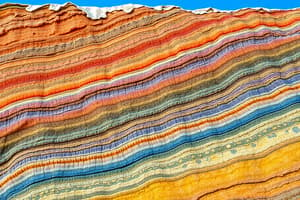Podcast
Questions and Answers
What is lithification?
What is lithification?
When sediment carried by water, winds or ice settles and becomes a sedimentary rock.
Name three important things about sedimentary rock.
Name three important things about sedimentary rock.
1 - Economically important (This is where coal, natural gas, oil and useful minerals are found.) 2 - Sedimentary rocks contain fossils to study the past. 3 - Scientists study the rock layers (strata), which hold clues to past surface environments.
How are detrital sedimentary rocks classified?
How are detrital sedimentary rocks classified?
Detrital sedimentary rocks are classified by their dominant particle size: coarse, medium, fine, or very fine.
What are the five category rock names of detrital sedimentary rocks?
What are the five category rock names of detrital sedimentary rocks?
What are the common minerals found in detrital sedimentary rocks?
What are the common minerals found in detrital sedimentary rocks?
What is the difference between a detrital sedimentary rock and a chemical sedimentary rock?
What is the difference between a detrital sedimentary rock and a chemical sedimentary rock?
What do rock salt and gypsum have in common?
What do rock salt and gypsum have in common?
What is coal made of?
What is coal made of?
What is compaction?
What is compaction?
Compaction is the most important in the formation of what rock?
Compaction is the most important in the formation of what rock?
What is cementation?
What is cementation?
What do fossiliferous limestone and coal have in common?
What do fossiliferous limestone and coal have in common?
Flashcards
Lithification
Lithification
The process of sediment transforming into sedimentary rock through natural forces like water, wind, or ice.
Detrital Sedimentary Rocks
Detrital Sedimentary Rocks
Rocks formed from solid fragments of weathered rocks.
Conglomerate
Conglomerate
A type of Detrital sedimentary rock with rounded particles.
Breccia
Breccia
Signup and view all the flashcards
Sandstone
Sandstone
Signup and view all the flashcards
Siltstone
Siltstone
Signup and view all the flashcards
Shale
Shale
Signup and view all the flashcards
Chemical Sedimentary Rocks
Chemical Sedimentary Rocks
Signup and view all the flashcards
Compaction
Compaction
Signup and view all the flashcards
Cementation
Cementation
Signup and view all the flashcards
Biochemical Sedimentary Rocks
Biochemical Sedimentary Rocks
Signup and view all the flashcards
Coal Formation
Coal Formation
Signup and view all the flashcards
Study Notes
Lithification
- Lithification is the process by which sediment settles and transforms into sedimentary rock through natural forces such as water, wind, or ice.
Importance of Sedimentary Rocks
- Economically significant as they contain resources like coal, natural gas, oil, and various minerals.
- Preserve fossils that provide insights into ancient life and environments.
- Rock layers (strata) contain evidence of historical surface conditions.
Classification of Detrital Sedimentary Rocks
- Detrital sedimentary rocks are categorized based on particle size: coarse, medium, fine, or very fine.
Categories of Detrital Sedimentary Rocks
- Conglomerate: composed of rounded particles.
- Breccia: made up of angular fragments.
- Sandstone: contains sand-sized particles.
- Siltstone: consists of silt-sized particles.
- Shale: composed of clay-sized particles.
Common Minerals in Detrital Sedimentary Rocks
- Predominantly consist of clay minerals and quartz.
Difference Between Rock Types
- Detrital sedimentary rocks originate from solid particles of weathered rocks, while chemical sedimentary rocks form from dissolved materials precipitating from water bodies.
Rock Salt and Gypsum
- Both are chemical sediments that precipitate from water and have commercial uses.
Formation of Coal
- Coal is primarily organic in origin, formed from the burial and transformation of significant plant material over time.
Compaction Process
- Compaction occurs when the weight of overlying materials compresses deeper sediments, reducing pore space between the grains.
Importance of Compaction in Rock Formation
- Compaction plays a critical role in the formation of shale, a fine-grained sedimentary rock.
Cementation Process
- Cementation involves minerals carried by water filling the spaces between sediment particles, effectively binding them together.
Commonality of Fossiliferous Limestone and Coal
- Both are classified as biochemical sedimentary rocks, containing organic materials or organisms, indicating a biological origin.
Studying That Suits You
Use AI to generate personalized quizzes and flashcards to suit your learning preferences.




